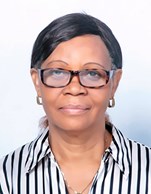
Blog author
Norah O. Akinola FACP, BSc, MBChB, Dip. Haem, PhD, FMCP, FMCPath
Professor of Haematology, Department of Haematology and Immunology, Obafemi Awolowo University, Nigeria
It all started when my oncology research group received a grant from the Tertiary Education Trust Fund (TETFund) of Nigeria to study molecular markers of specific common cancers (including breast, prostate, cervix and lymphoproliferative malignancies).
One of our primary objectives was to establish a FISH laboratory by upgrading our existing cytogenetics facility in the Department of Haematology and Blood Transfusion, Obafemi Awolowo University Teaching Hospital Complex, Nigeria.
Beginning our journey

- Embarking on this journey I visited my mentor, Professor Ghulam Mufti (Professor of Haemato-oncology, King's College Hospital, United Kingdom) who introduced me to Robert Dunn (Haematological Malignancy Diagnostic Service, King's College Hospital, United Kingdom) where we discussed the practicalities of establishing a FISH laboratory.
- We planned for Robert to visit my laboratory where he would help train my team on FISH procedures. Upon my return to Nigeria, Robert had kindly provided all the essential information and standard operating procedures (SOPs) required to upgrade our existing cytogenetics facilities and we were ready to set up our new laboratory.
Overcoming global challenges

- While we had planned to obtain the equipment, consumables and reagents for the laboratory, the COVID-19 pandemic struck and with public health measures in place, such as lockdowns, we experienced considerable delays with the laboratory set up.
- It was also not possible for Robert to travel to Nigeria, as planned, however we continued to communicate our challenges and progress as we continued to move towards establishing our new facility.
Partnering with OGT

- With things returning back to normal, I returned to Robert’s laboratory to refresh myself on the FISH procedures and once back in Nigeria, I was introduced to Richard Evans (Senior Business Development Manager EU & ROW, OGT, United Kingdom).
- Richard, and the team at OGT undertook a virtual tour of our lab and confirmed that the basic equipment for FISH set up and analysis was in place. Additionally, they provided support and advice for microscope set up, suitability of filters for signal pattern analysis and the protocols that needed to be put in place.
- OGT provided the CytoCell® P53 (TP53) Deletion, CytoCell RARα (RARA) Breakapart, CytoCell MYC Breakapart, and CytoCell BCL2 Breakapart FISH probes for us to experience for ourselves. Additionally, Richard inspected our newly set up laboratory via video call and gave his approval for our workflow.
Success for CytoCell and our lab

- Upon receiving the CytoCell FISH probes through our country distributor, Inqaba Biotech, and in combination with the SOPs we had already received we were ready to begin, however one final obstacle that we needed to overcome was effectively using fluorescence microscopy for detection of our samples.
- To aid us in finalizing our processes, Richard brought us into contact with Laurence Cambridge (Field Application Specialist – FISH, OGT, United Kingdom) who, over the course of several virtual sessions, supported protocol development with our technical staff. In addition, sample slides were prepared by OGT and shipped to Nigeria so that the suitability of the microscope filters could be assessed knowing that the FISH probes provided had been successful.
- While our lab had limited equipment, no prior experience in the FISH protocols and only access to remote support, thanks to OGT’s support we successfully analysed and viewed our first CytoCell FISH probe samples and shared slides and images with Laurence who validated our findings and also assisted with the analysis of more difficult slides.
 Image (above): Photos of the FISH Laboratory at Obafemi Awolowo University Teaching Hospitals Complex, Nigeria
Image (above): Photos of the FISH Laboratory at Obafemi Awolowo University Teaching Hospitals Complex, Nigeria
At the 50th Anniversary celebration of the Nigerian Society of Haematology and Blood Transfusion conference, I presented the results of our TETfund study for lymphoproliferative malignancies on behalf of the team.
I shared this presentation with Richard who had expressed his wish to continue to support our future projects to further study chronic lymphocytic leukemia (CLL) in Southwest Nigeria using FISH probes and next generation sequencing (NGS).
We are so grateful to all who were part of this success story and look forward to our continued collaboration with OGT in the future.
Contact OGT to see how you can leverage our FISH expertise to ensure you maximize your workflow efficiency





 Image (above): Photos of the FISH Laboratory at Obafemi Awolowo University Teaching Hospitals Complex, Nigeria
Image (above): Photos of the FISH Laboratory at Obafemi Awolowo University Teaching Hospitals Complex, Nigeria 


